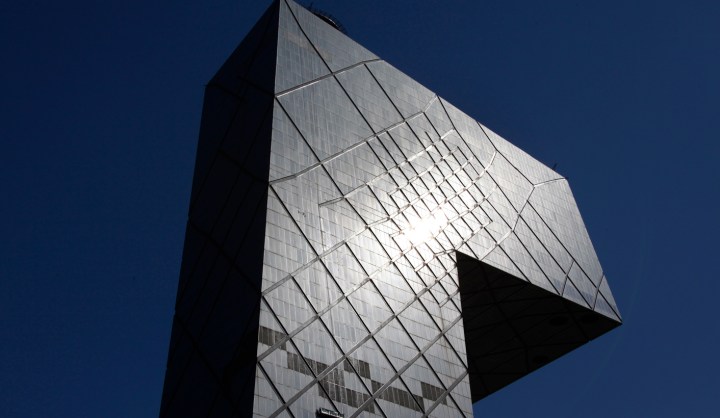World
Big Brother is being watched by you: Chinese television and Africa

CCTV, China’s state-run television network, and Xinhua, the state-run news agency, have a mandate to provide “alternative” African stories—read: happy-go-lucky, anodyne versions of the continent. Marikana, like Mali, South Sudan and other recent dirges from the African songbook, are proving to be a challenge. RICHARD POPLAK watches telly in China.
Well, here’s a relief: Mac Maharaj, President Jacob Zuma’s indefatigable spokesperson, sounds just as much a non sequitur on Chinese state television as he does on Radio 702. CCTV, ubiquitous with eight channels on every jerry-rigged flatscreen in every pokey hotel room in the country, couldn’t help but cover the weekend flare-up on the Lonmin mine in Marikana, North West Province. As the station played an endless loop of cops firing rubber bullets at fleeing miners, the CCTV anchor lobbed a couple of beach balls at Mac, who treated them like exploding grenades. Which is when the anchor got shirty.
Will the mining industry be affected by the violence, wondered CCTV? What violence, wondered Mac? Can he foresee an end to the stand-off? What stand-off? It’s been acknowledged that rubber bullets can be lethal… Rubber bullets are NEVER lethal. And so on.
The Marikana merry-go-round was a rare thing for CCTV, an organisation that, like all state-run Chinese media outlets, has something of an obligation to provide balanced reporting on African stories. The New York Times recently ran a piece about Chinese state-run media in Africa, and it read like boilerplate New York Times-in-the-Dark-Continent stories always read. A précis: the $7-billion charm offensive is meant to counter Western media hegemony in the region, a soft power initiative that has sinister implications for African human rights, because the temporary detente on committing continental scale genocide could be undermined by watching Chinese propaganda. Or something.
Regardless, that doesn’t explain why the Chinese are being force-fed happy tales of smiling Ghanaians and cheerful Congolese. I’m not sure that the Chinese authorities care what Africans in the Guangzhou trading hub think, especially when they’re shoving them into paddy wagons and hauling them off to the airport. No, all of this coverage is meant to change Chinese perceptions of Africa. And the question therefore becomes: why go to all the trouble?
Most black Africans in China will tell you that while the Chinese are racist, they aren’t racist in the same way Westerners are. “It is just pure ignorance,” a Nigerian aerospace graduate recently told me, “they never have seen a black person, so they don’t know.” In Guangzhou, perceptions are created by the trading underclass that haunts the Xiaobei area, many of whom have no papers, and are here for less than legal purposes. On Weibo—Chinese Twitter—and on blogs like this one, there are racist outbursts that backwater Alabama peckerheads would be ashamed of.
That said, China is a big country, and CCTV and other parastatal propagandists are working with a clean slate. Although it must be said that most China wonks don’t share the New York Times’ belief in the power of state-run media to forge perceptions: “Young Chinese don’t watch CCTV,” Jeremy Goldkorn, a respected China watcher and impresario of the Danwei blog told me. “They don’t believe a thing on TV, they think it’s all bullshit. They have their own way of getting information.”
Which is a bit of a shame, because last night in Guangzhou, I watched a fine documentary on the Cape Town-based art magazine Chimuranga. This publication takes a different form each issue—once a photocopied sheaf, next a blurry zine. It’s known only to a small circle of the right people, and I was stunned to channel-surf my way into a CCTV-funded film featuring this revolutionary-tinged avant-garde institution. The film was expertly produced by Neil Brandt and Dan Jawitz, of Fireworks Media, and I must tell you, it was as happy a half hour as I’ve spent in front of a television set in quite some time. There were no half measures, no pandering, no obvious techniques to make me fall in line with CCP policy. Just good, old-fashioned documentary television.
In this, CCTV is chasing the Al Jazeera model. I spent some time covering Al Jazeera in Doha, Qatar, as they were launching their English channel in 2007, and while the station was most certainly designed to counter both American and Saudi influence in the region and beyond, there was a genuine esprit for telling stories ignored by the mainstream Western outlets. This was particularly apparent in Al Jazeera’s African reporting, which seemed to have no real mandate except to provide a broader perspective. Yes, Al Jazeera’s position was self-righteously anti-American and anti-Saudi, and no, they haven’t contributed in any way to Qatari democracy, but they have done some decent African programming over the years, a lot of which can be enjoyed without worrying about its geopolitical intentions.
But Chimuranga? That’s a different level altogether. Fireworks Media have obviously been hired because of their insider status, and the programming they’re delivering most certainly adds to a broader perspective, one you certainly wouldn’t encounter on CNN, or BBC World, which tend to concentrate on the tragedies. And so the Chinese that do watch CCTV (the network claims to have 200 million viewers outside China—how many of those watch TV in English is anyone’s guess) get a fuller picture of the complexity and cultural vibrancy of the African continent.
The question, once again, is “why?” For one thing, the Chinese authorities have to sell the Chinese public on the fact that they are pumping billions of dollars into a continent most of their constituents can’t find on a map. “Africans are our great, historic friends,” is a line one hears repeatedly from Chinese officials in Beijing, most of whom still feel beholden to the continent for the votes necessary to bring the People’s Republic of China onto the UN Security Council in 1971. They regularly recite the closeness of South/South relations, the Afro-Asian Bandung Conference in 1955, and other historic ties that bind. But the average Chinese knows nothing of all this—all they hear is that billions of renminbi are being set to a faraway place, when China still needs to be properly developed. CCTV’s job is to make Africa fully real, fully human, and thus worthy of Chinese benevolence.
For another, there is a genuine ambivalence to Western programming on Africa—another fact that is patently clear when one interviews Chinese officials. The notion of Africa as a disease-ridden backwater is bad for business—it scares off entrepreneurs and other high-level talent who could otherwise help Chinese interests on the continent. The more smiles on TV the better. At the very least, they can’t hurt.
But, occasionally, something like Marikana breaks through and helps reinforce old stereotypes. The Chinese have heard from the likes of Mac Maharaj before. In Libya, in Tunisia, in Iraq—the spokesperson whose pronouncements are entirely at odds with reality. Marikana will come and go as a story, and then CCTV will get back to the Chimurangas of the world. One hates to say it, but their version of the continent is an appealing one. There are days when it may even be more right than wrong. DM
Photo: The CCTV (China Central Television) building on a sunny day in central Beijing March 22, 2011. REUTERS/David Gray

















 Become an Insider
Become an Insider